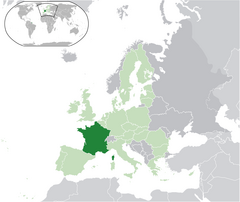| Provinz von Frankreich(de) | |||||
|---|---|---|---|---|---|
| Province de France (fr) | |||||
| Province of the Duchy of Brunswick | |||||
| |||||
| Capital | Paris | ||||
| Official language Regional languages |
German (de facto), French Many Recognized Regional Languages |
||||
| Demonym | French | ||||
| Government Type - Monarch - Statthalter |
Constitutional Monarchy Princess Victoria Leander Schwerin |
||||
| Total Area | 260,558 sq. mi. | ||||
| Time Zone | CET | ||||
The Province of France (German: Provinz von Frankreich) is a province of the Duchy of Brunswick. The province is made up of the former Republic of France. It is bordered by the provinces of Belgium, Germany, Switzerland, Italy, and Spain. It is bordered by the Atlantic Ocean, the North Sea, and the Mediterranean Sea. Its capital is Paris.
History[]
France was first settled in the Paleolithic times by the Celts, later known as Gauls. The Greeks and Phoenicians established settlements around 600 B.C., one of them being in Marseille. Gaul was conquered by Julius Caesar around mid-50 B.C. and remained under Roman occupation until the invasion of the Franks in the 5th century A.D. In 843 A.D., the Treaty of Verdun divided the territory of Gaul among the French, Germans, and Italians. Charles the Bald inherited Francia Occidentalis. The crown passed to Hugh Capet in 987 and thus created the Capetian line. The Capetian line lasted until 1328 when Philip VI, a member of the House of Valois, acceded to the throne and made France the most powerful European nation by capturing the French provinces held by the kings of England. This created a conflict which was settled by the Hundred Years’ War, which began in 1338. The French had the final victory in 1453 by capturing Castillon. The English still held Calais and the Valois would soon add Burgundy and Brittany, which is very similar to modern France. The country went through turmoil during the 16th century with the spread of Protestantism and Catholic opposition to the Reformation. The Bourbon dynasty granted religious tolerance in 1598 with the Edict of Nantes. Absolute monarchy reached its zenith with the Sun King, Louis XIV. The French Revolution began after foreign wars weakened the French government. The First Republic was established and lasted until Napoléon Bonaparte declared himself Emperor in 1804. The nephew of Napoléon, Prince Louis Napoléon I, declared the Second Empire in 1852 and became Napoléon III. The Franco-Prussian War resulted in his defeat and abdication and the Third Republic. France became the dominant European power after the First World War. Northern France was occupied by the Germans in June 1940 and Vichy France, the southern unoccupied territory, became a state with deep ties with the German government. France was liberated in August 1944 and the provisional government became headed up by General Charles de Gaulle. The Fourth Republic was created in 1946 and became the French Union. Conflict in French territories left the country weak and a Fifth Republic was established in 1958 by de Gaulle, who later became president of the Republic.
France became a province of the Duchy in 2009.


